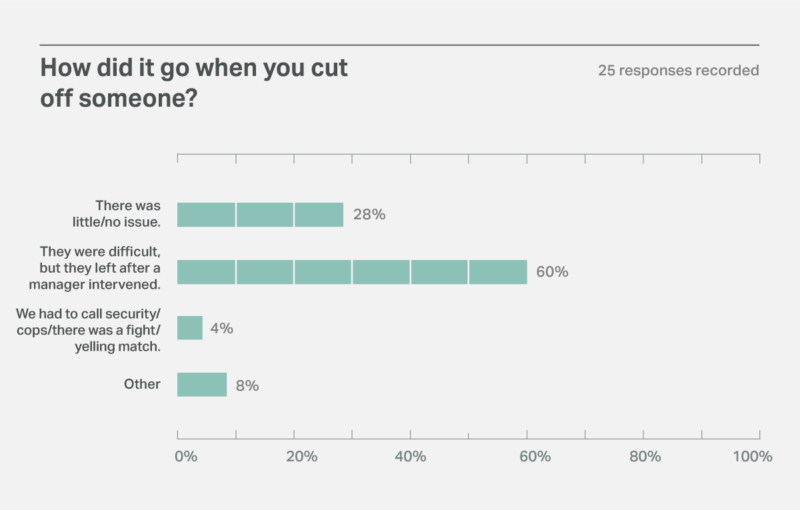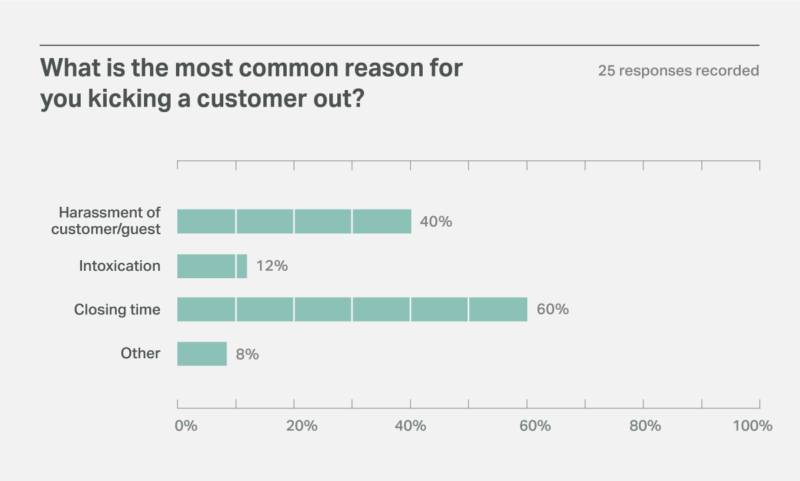


I looked up in time to see my coworker get an unfortunate piña colada bath. The guest kept screaming obscenities as security carried them away. It was a busy Saturday night at our very high-volume restaurant. At a venue like ours, it was only a matter of time before the mixture of alcohol, adrenaline, and competition resulted in people making poor behavioral decisions. While not every situation of a guest being cut off ends with a coconut-scented shower, that kind of aggression is an all-too-common experience for bartenders. Part of the problem is we, the bar staff, are educated to understand alcohol, but our guests aren’t.
Start Your Free Trial With Bevspot Today!
It’s a common problem that various establishments approach differently. I surveyed 25 fellow hospitality professionals to better understand why they kick out customers and how they handle the conflict – probably the least fun part of working at a restaurant, next to doing kitchen inventory.

When the bar is full, there’s never an easy way to tell someone they can’t have their booze. Cutting off a guest puts the bartender in an awkward and sometimes dangerous position. With the exception of one time, most guests I’ve confronted usually become aggressive, defensive, and menacing.
Mark Schettler of New Orleans’ Bar Tonique had this to say, “I think that the baseline job of any bartender is to keep everyone, staff included, feeling safe and comfortable. If a guest, or staff member, isn’t able to abide that, they’re gone. Sometimes, a warning and/or redirect is in order and suffices, sometimes the line is crossed so egregiously that the offending party has to be immediately 86’d.”
It’s a bartender’s job to make sure that their customers have a great experience, and are safe in the process. We aren’t looking to kick people out when we cut them off, but that seems to be the assumption by many, and a cut off unfortunately can turn into getting kicked out.

While closing time was the number-one surveyed reason for kicking out a customer, harassment was the most common selection on the first day I released the survey. It was also a main anecdote cited by those who shared stories. One person who took the survey shared this, “[I have] almost too many [stories] to share. I have had bottles thrown at me, been called every name you can possibly imagine, been challenged to countless fights, stepped into the middle of several others, tackled fleeing felons, and even been threatened with a glass that a guest had just broken over the bar.”
If you have to kick someone out, make sure the person who does it is someone with authority and autonomy to make bigger decisions, such as a head bartender or manager. While the law empowers any bartender to refuse service, it’s best to let those above you handle the situation.
Managers should also be trained on how to best handle cut-offs. Keep your cool to avoid triggering an emotional response. Get the story from the guest and be empathetic, but don’t throw your bartenders under the bus. Your responsibility as a manager is to protect your business, which includes your bar staff and your guests.
Whether you’re a bartender or a bar manager handling a situation, document everything so everyone can learn from the experience. It’s good practice to keep a notebook for bartenders to fill out with details on each day. The notebook was incredibly useful in instances where I had to document an event with police.
Communication is key to running a successful bar and bar team, especially in times of conflict. After the event, gather the team together to discuss what happened and document it together. Nobody likes to kick people out, but when you demonstrate solidarity in doing right by the business and each other, the situation will be easier to handle, and you’ll be better prepared for the future.

